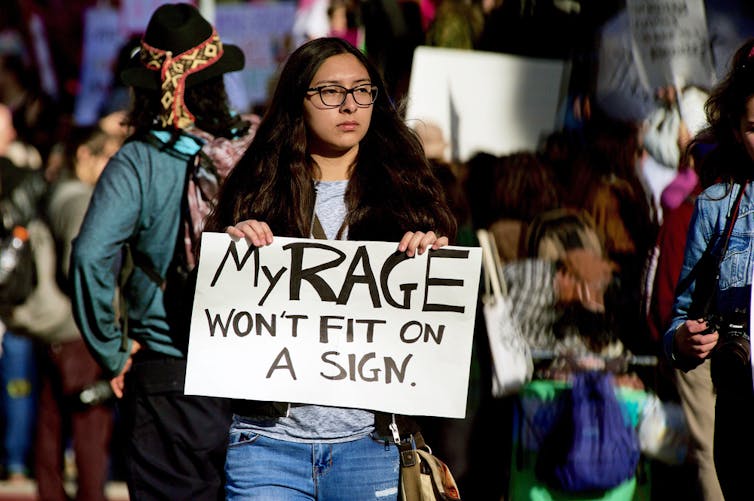Why misogyny and hate crime reforms need more than slick campaigns

Wolf-whistling, catcalling and groping make up just some of the intimidating behaviour that women experience every day from men. But there is an attempt underway in the UK parliament that seeks to protect women from this kind of “acceptable” misogyny.
On March 9, Wera Hobhouse, the MP for Bath in south-west England, presented her Hate Crime (Misogyny) Bill (2020) addressing misogyny – which is defined as “the dislike of, contempt for, or ingrained prejudice against women”.
The bill is designed to categorise misogyny as an aggravation (meaning when someone commits a crime out of hatred of a person’s gender) within the existing hate crime framework for sentencing in England and Wales. This does not mean that misogyny would become a hate crime, but that offenders would face a lengthier sentence if their behaviour is found to be motivated by misogyny. More unusually, it is also intended to require police forces to record hate crimes that are allegedly motivated by misogyny.
Where we are
Calls for misogyny to be included as a hate crime are relatively recent – at least, from a hate crime reform perspective. They largely emerge from demands by campaigners and politicians around significant events such as International Women’s Day, which generate a high level of publicity.
In Scotland, England and Wales there have been almost simultaneous consultations on the issue of amending hate crime law – including questions of expanding protected characteristics to include, among others, sex or gender. A protected characteristic is a particular feature of a person – such as race or religion – that cannot form the basis for hatred in the eyes of the law.
The One Scotland consultation was completed last year, while the Law Commission in England and Wales is yet to publish its consultation paper. This progress aside, no firm decision has been reached on the way to pin down misogyny within hate crime law – despite a recent reflection from the Law Commissioner, Penney Lewis, suggesting that adding sex/gender as protected characteristics would be helpful – something that we also argued in our recent book.
Proposals for reform
The latter aspect of Hobhouse’s proposed legislation – which requires police forces to record hate crimes that are allegedly motivated by misogyny – is intriguing. This is particularly so, given the independent actions of some police forces to record misogyny hate “incidents”, when there is no criminal offence amounting to misogyny in current law. Reaching a consensus on definition is not likely to be straightforward, given the complete absence of any legal definition of misogyny or misogynistic behaviour.
Still, the ambition to include misogyny as a hate crime is something that is seeing greater attention from campaigns such as those in Nottingham in 2016, and in Greater Manchester since 2019. And while these campaigns have their place in raising awareness, ultimately they may confuse the situation more.
In seeking the recording of hate crimes motivated by misogyny – as opposed to the lesser classification of “incidents” – there is an assumption that there is an underlying act of criminality, but also that there is clear evidence of motivation based on prejudice against women. Current reporting of hate crimes does not capture data broken down into subcategories such as gender, for example.
The Scottish view
The situation in Scotland is developing in different ways, with the Scottish government in a more advanced position than England and Wales when it comes to the most recent hate crime reforms. The proposals in Scots law focus on two aspects: first, the creation of a gender aggravation, but also a standalone offence of misogynistic harassment.
The first element of this reform would add to the existing protections for hate crime, whereas the second aspect would create a standalone offence outside of the hate crime framework. The question of defining misogyny remains unresolved though – as does the definition of misogynistic harassment, given the limitations of harassment in the Protection from Harassment Act 1997 in Scotland.
As we argue in Online Misogyny as a Hate Crime and in our recent research, this brings little actual change for women who are victims of crimes motivated by hostility or prejudice against them.
The fact that police forces recognise a reported act as motivated by misogyny does not and cannot translate into a legal classification as hate crime due to the fact that misogyny (unlike, say, race, religion, or sexual orientation) is not currently a protected characteristic in Scots law, nor in England and Wales. This brings no tangible benefit to the victims of such crime – for instance, a higher sentence is not possible – and also fails to effectively translate into legal recognition of the crime as motivated by prejudice or hostility towards women.

There is little doubt that the Hate Crime (Misogyny) Bill (2020) has merit – again it raises the issue of misogyny and draws attention to the issues of hatred towards women. That said, its timing was interesting – notionally attached to International Women’s Day. Given the ongoing Hate Crime Consultation by the Law Commission of England and Wales, the timing of the bill is questionable, not least because it could well undermine some of the intended reform proposals. Failing that, the 2020 bill could mean legislation is enacted for a very short period of time before it is repealed, assuming the proposed bill gets sufficient support to proceed through parliament.
Should it be enacted, questions remain as to how it will fare in light of the proposed consultation and subsequent reforms. The approach of the Scottish government is more encouraging, with a commitment to tackle gendered hate, but also with more thought given as to how to future-proof the hate crime framework.
Similar discussions are about to commence in Northern Ireland, where they will perhaps have the benefit of lessons learned by Scotland in this process. Whatever the outcome in each of the four countries, the idea of gender-based hate is likely to attract controversy and criticism. But it is, at the very least, encouraging to see gender-based protections getting the attention they need.![]()
Kim Barker, Lecturer in Law, University of Stirling and Olga Jurasz, Senior Lecturer in Law, The Open University Law School
This article is republished from The Conversation under a Creative Commons license. Read the original article.
